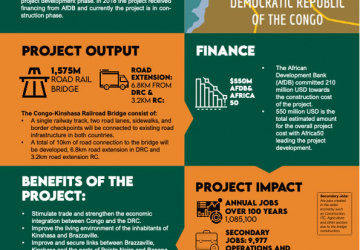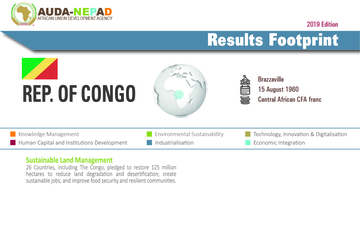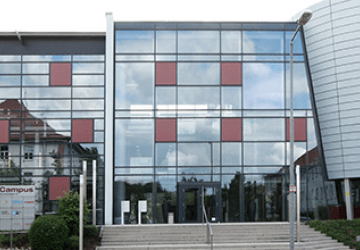 Congo
Congo
Official Name: Republic of Congo
Capital: Brazzaville
Independence Day: 15 August 1960
Currency: Central African CFA franc
Key Result
The country is expected to benefit from the Kinshasa-Brazzaville Bridge Road/Rail Project, which entails the construction of a fixed crossing linking Kinshasa in Democratic Republic of Congo (DRC) with Brazzaville in the Republic of Congo.
The Pointe Noire, Brazzaville/ Kinshasa, Bangui, N’djamena Multimodal Corridor aims to resuscitate the river transport in the Congo-Ubangi River Basin and to modernise road transport along the corridor.
The continent has a target of committing 100 Million hectares of land for restoration through the application of the restoration opportunities assessment methodology. To-date, the Republic of Congo has committed 2 million ha.
The Republic of Congo signed the CAADP Compact in 2013, committing to prioritise agricultural transformation and development. An Independent Technical Review of the country’s National Agricultural Investment Plan (NAIP) and agriculture public expenditure studies were conducted. A number of programmes in the area of agriculture, livestock, forestry and fisheries are currently being implemented in support of the NAIP. According to a Biennial Review, the Republic of Congo scored high in terms of implementation of the CAADP process. This resulted in 70% of farm, pastoral, and fisher households being resilient to climate and weather; 10.7% annual growth of the agriculture value added; 100% official development assistance (ODA) disbursed to agriculture against commitments; and 117% increase of the size of irrigated areas from its value of the year 2000.
A study was undertaken and a report published on the state of the environment of seven countries – including the Republic of Congo. The report specifically highlights the state of mangrove swamps and coasts of Western Africa and Central Africa. Other countries included in the study were Cameroon, Cote d’Ivoire, Ghana, Guinea and Senegal.
Related
Projects

A critical AU Model Law aimed at harmonizing medical products regulatory systems in Africa was endorsed by African Heads of State and Government at the January 2016 AU Summit in Addis Ababa, Ethiopia. The AU Model Law will contribute towards accelerate the regulation of safe, quality and affordable medical products and technologies in Congo.
Central Africa has embarked on a collaborative framework that will stipulate the activities, roles and responsibilities for implementing an MRH programme in the region. Congo is participating in a mapping exercise in 2016 that shall establish regulatory systems that will guide ECCAS and OCEAC Member States in setting up an MRH programme.

CAADP Compact: Congo signed the CAADP Compact on 10 December 2013.
Capacity Building: Technical experts were deployed to Congo to undertake independent technical reviews of its National Agricultural Investment Plan (NAIP).
An Independent Technical Review (ITR) of Congo’s NAIP and agriculture public expenditure studies were conducted, and technical support is planned to develop programmes from the NAIP.
Congo also received support (in collaboration with ReSAKSS) in establishing Strategic Analysis and Knowledge Support Systems (SAKSS) to inform and guide the CAADP implementation process.
Business: Technical and advisory support was provided to the Republic of Congo business meeting for its Plan National d’Investissement Agricole et de Sécurité Alimentaire et Nutritionnelle (PNIASAN) in which CFA390 billion was agreed on for seven programmes, 26 sub-programmes and 58 activities in agriculture, livestock, forestry and fisheries. The government will cover 70 per cent of the cost, development partners 24 per cent and the private sector 6 per cent.
Results:
- More than 3,000 farmers have been trained on different crop production strategies and how to speculate on livestock prices.
- A disease destroying cassava production has been eradicated enabling the country to become self-sufficient in this basic foodstuff. There has also been an increase in the production of eggs.
- Other achievements include the financing of several small projects, the opening up of production land by rehabilitating rural roads and waterways, as well as opening up agriculture to foreign investment.

Project : TAH programme
Description : This is phase I of the continental connectivity programme that focuses on completion and standardisation of the TAH missing links by 2030
Project : Single African Sky phase 1 (design and initial implementation)
Description : Single African Sky is a continental programme that will create a high-level, satellite-based air navigation system for the African continent
Project : Yamoussoukro Decision implementation
Description : Accelerate Yamoussoukro Decision implementation by identifying countries that are ready to fully implement it, and discussing and agreeing with both their governments and airlines to launch the voluntary club on a full membership basis;
Project : ICT Enabling Environment
Description : This programme would improve the environment for the private sectors to invest in high-speed broadband infrastructure
Project : ICT Terrestrial for Connectivity
Description : This programme has two main components : secure each country connection by at least two broadband infrastructure and ensure the access to submarine cable to all landlocked countries
Project : Internet Exchange Point (IXP) programme
Description : The aim of this programme is to provide Africa with adequate internet node exchange to maximise internal traffic
Project : Pointe Noire, Brazzaville/ Kinshasa, Bangui, N’djamena Multimodal Corridor
Description : This multimodal programme would resuscitate he river transport in the Congo-Ubangi River Basin and modernize road transport along the corridor
Project : Kinshasa-Brazzaville Bridge Road and Project & Rail to Ilebo (DFS)
Description : This programme would provide infrastructure to improve the regional transportation and
trade systems through the construction of a fixed crossing linking Kinshasa and Brazzaville, ensuring continuity in railway traffic from Matadi and Pointe-Noire to the eastern border of the DRC and, beyond that towards the eastern and southern parts of Africa
Project : Central African Inter-Capital Connectivity
Description : This programme is specially designed for Central Africa, where one of the key issues for regional integration is the missing links in several intercapital connectors
Project : Central Africa Air Transport
Description : This programme aims at increasing the air transport service levels as well as airport improvement in Central Africa, which are currently limited by the lack of a regional air hub
Project : Palambo
Description : Regulation dam to improve navigability of Obangui River with added hydropower
component



Advocacy and Strengthening of Negotiation Capacities on Post-2015 Development Agenda through the Common African Position (CAP)
Global Partnership for Effective Development Cooperation (GPEDC)
The Global Partnership is an inclusive political forum bringing together governments, bilateral and multilateral organisations, civil society and representatives from parliaments and the private sector, committed to strengthening the effectiveness of development co-operation to produce maximum impact for development. Through its multi-stakeholder platform, the Global Partnership provides support, guidance and shares knowledge to boost development impact with a strong country focus, and to ensure a degree of coherence and collaboration among all development stakeholders on co-operation flows and policies. It offers a global mechanism to ensure co-operation is based on Busan principles of ownership, results, inclusiveness; and transparency and accountability to deliver tangible results on the new SDGs. NEPAD Agency is the Africa’s Secretariat for the Global Partnership.

Project : Kinshasa-Brazzaville Bridge Road/Rail Project
Description : The construction of a fixed crossing linking Kinshasa in Democratic Republic of Congo (DRC) with Brazzaville in Republic of Congo
Description : The use of political gravitas and goodwill to unblock and facilitate political bottlenecks affecting the implementation of ICT broadband and optic fibre projects on the continent


At the beginning of 2014, 37 of the 42 opted-in African countries have completed a rapid assessment / gap analysis. The next step for countries is to develop a SE4LL Action Agenda and Investment Prospectus(es). To support this process, the SE4ALL Africa Hub partners have led the development of Africa Guidelines for SE4ALL national Action Agendas. The Africa Guidelines lay out principles and process for developing Action Agendas and put forward a balanced approach of centralized and decentralized solutions to achieve universal access to energy services.
Progress in Republic of Congo:
Joined SE4All initiative"
you agree to the AUDA-NEPAD Privacy Policy.




